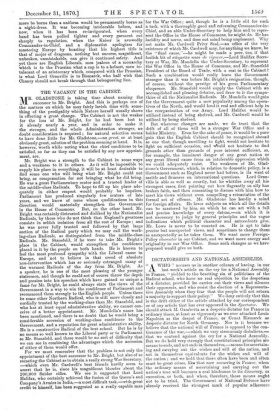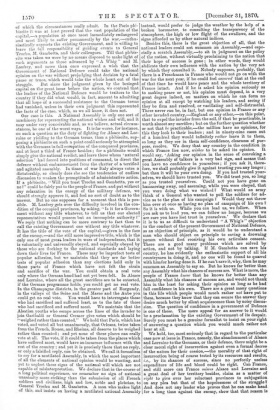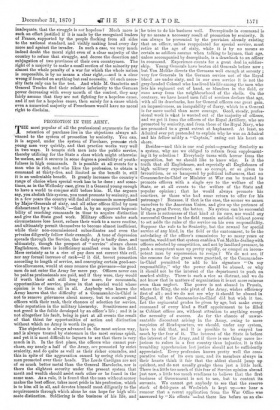DICTATORSHIPS AND NATIONAL ASSEMBLIES.
"A WHIG" accuses us in another column of having, in our last week's article on the cry for a National Assembly in France, "yielded to the besetting sin of politicians of the Radical school, who have no real objection to the despotism of a dictator, provided he carries out their views and silences their opponents, and who resist the election of a Representa- tive Assembly when they fear that the people will not return a majority to support their policy." We deny entirely that this. isthe drift either of the article attacked by our correspondent or of any article that has ever appeared in the Spectator. We should attack M. Gambetta as a despotic dictator for France in ordinary times, at least as vigorously as we ever attacked Louis Napoleon as the despot of France, or Count Bismarck as despotic dictator for North Germany. Nor is it because we believe that the national will of France is opposed to the con- tinuance of the war,—which we very strenuously disbelieve,— that we contend against the cry for a National Assembly. But we do hold very strongly that constitutional principles are means to ends, and not ends in themselves,—means for ascertain- ing and carrying out the wishes and will of the nation, and not in themselves equivalents for the wishes and will of the nation ; and we hold that there often have been and often must be great crises, like that now occurring in France, when the ordinary means of ascertaining and carrying out the nation's true will becomes a real hindrance to its discovery, or execution, or both, and when, therefore, those means ought not to be tried.. The Government of National Defence have already received the strongest mark of popular adherence
of which the circumstances really admit. In the Paris ple- biscite it was at least proved that the vast population of the capital,—a population at once most immediately endangered and most likely to suffer permanently by the war,—enthu- siastically supports the existing Government, and is willing to leave the full responsibility of guiding events to General Trochu, Id. Gambetta, and their colleagues. Till that plebis- cite was taken we were by no means disposed to make light of such arguments as those advanced by "A Whig" and M. Lanfrey, and more than once expressed a wish that the Government of National Defence could take the national opinion on the war without prejudging that decision by a fatal pause or truce, which would take the whole heart out of the struggle. But since the judgment given by the besieged capital on the great issue before the nation, we contend that the leaders of the National Defence would be traitors to the country if they did what would, in fact, amount to admitting that all hope of a successful resistance to the German terms had vanished, unless in their own judgment this represented the facts of the case, which, as we all know, it does not.
Our case is this. A National Assembly is only one sort of machinery for representing the national wishes and will, and it may under very conceivable and, as we believe, actual circum- stances, be one of the worst ways. It is far worse, for instance, on such a question as the duty of fighting for Alsace and Lor- raine or yielding to the German terms, than a plebiscite, sup- posing a plebiscite on such a point could seriously be attempted with the Germans in full occupation of the conquered provinces, and at least a third of France besides ; for a plebiscite would simply give the national verdict, and leave those whom natural selection' had forced into positions of command, to direct the defence without embarrassment from the chatter of a terrified and agitated assembly. In times of war Italy always votes a dictatorship, so clearly does she see the tendencies of endless discussion to weaken the promptitude of administrative action. If a plebiscite, "Will you trust Trochu and Gambetta, yes or no ?" could be fairly put to the people of France, and put without any relaxation in the energy of the military defence, we should strongly approve it, and feel no sort of doubt as to the answer. But no one supposes for a moment that this is pos- sible. M. Lanfrey gets over the difficulty involved in the con- dition of the occupied provinces, by asking, "Is it for a Govern- ment without any title whatever, to tell us that our elected representatives would possess but an incomplete authority ?" We reply that nothing can be more contrary to fact than to call the existing Government one without any title whatever. It has the title of the vote of the capital,—given in the face of the enemy,—and the still more impressive title, which is the only one of most great leaders in wars of independence, that it is voluntarily and universally obeyed, and especially obeyed by those who are flocking to the national standards and laying -down their lives for France. These may be imperfect tests of popular adhesion, but we maintain that they are far better tests of popular adhesion than any elections held only in those parts of France which have not felt the strain and sacrifice of the war. You could obtain a real vote only where the German hand had not yet been felt. In Alsace and Lorraine, where all the great sacrifices are to be extorted, if the German programme holds, you could get no real vote. In the Champagne districts, in the greater part of Burgundy, in the valleys of the Seine and the Marne and the Aube you could get no real vote. You would have to interrogate those who had sacrificed and suffered least, as to the fate of those who had sacrificed and suffered most. We maintain that the Alsatian youths who escape across the lines of the invader to join Garibaldi or General Cremer give votes which should be "weighed rather than counted." We hold that Paris, which has voted, and voted all but unanimously, that Orleans, twice taken from the French, Rouen, and Rheims, all deserve to be weighed rather than counted ; and yet none of these places can really vote at all The vote, if it could be taken from the places which have suffered most, would have an immense influence with the rest of the country ; and yet it is precisely there that no reply, or only a falsified reply, can be obtained. We call it formalism to cry for a mutilated Assembly, in which the most important of all the elements of national opinion would be wanting, and yet to neglect those signs of the national will which are not capable of misinterpretation. We declare that in the course of a long political experience, we remember no sign of national unanimity more striking than the submission of all French soldiers and civilians, high and low, noble and plebeian to General Trochu and M. Gambetta. A man who makes light of this, and insists on having a mutilated national Assembly instead, would prefer to judge the weather by the help of a broken barometer, to consulting the transparency of the atmosphere, the high or low flight of the swallows, and the signs afforded us by other natural indices.
Besides this, there is the great objection of all, that the national leaders could not summon an Assembly,—and espe- cially a scratch Assembly,—to sit in judgment on the policy of the nation, without virtually proclaiming to the nation that their hope of success is gone ; in other words, they would abdicate their own influence with the nation by the very act by which they consulted it. Nobody supposes, probably, that there is a Frenchman in Prance who would not go on with the war for the next year, if he could feel assured that at the end of that time he would have peace and the whole territory of France intact. And if he is asked his opinion seriously as to making peace or not, his opinion must depend, in a very great degree indeed, on matters on which he can form no opinion at all except by watching his leaders, and seeing if they be firm and resolved, or vacillating and self-distrustful. There never can be, in fact, but one opinion in France or any other invaded country,—England or any other,—on this point, that to expel the invader from the soil, if that be practicable, is worth almost any sacrifice ; but on the further question whether or not that be practicable,—the million have no opinions, for this they look to their leaders ; and in ninety-nine cases out of a hundred they would infinitely rather leave it to them, so long as they see in them self-confidence, clearness of pur- pose, resolve. We deny that any country in the condition in which Prance lies now, wishes to be asked its opinion. It would say, 'Asking our opinion in the sense of convoking a great Assembly of talkers is a very bad sign, and means that you have no confidence in yourselves ; if you ask it, there- fore, we shall probably give it against trusting you any longer ; but then it will be your own doing. If you had trusted your- selves, we should have trusted you. We did trust you, so long as you trusted yourselves. Could not you have gone on hammering away, and assuming, while you were obeyed, that you were doing what we wished What would an army think of a General who wanted to poll the soldiers for ad- vice as to the plan of his campaign Would they not throw him over at once as having no plan of campaign of his own ? So it is with us. While you can lead us, we follow. When you ask us to lead you, we can follow no longer, because we are sure you have lost trust in yourselves.' We declare that it is to us as difficult to understand "A Whig's" objection to the conduct of the present Government of National Defence, as an objection of principle, as it would be to understand a man who should object on principle to saving a drowning person without first receiving his own articulate consent. There are a good many problems which are solved by action, and not by talking. If M. Gambetta can save his country, he has evidently the enthusiastic support of all his countrymen in doing it, and no one will be found to quarrel with him for having done it. If he can't save it, why, then he may summon an Assembly to say so. But he knows far better than any Assembly what his chances of success are. What is more, the people of France know that he knows far better than any Assembly what his chances of success are, and would not thank him in the least for asking, their opinion so long as he had full confidence in his own. There are a great many questions in this life which people would much rather not have put to them, because they know that they can secure the answer they desire much better by silent acquiescence than by noisy discus- sion. The question of confidence in a government of Defence is one of these. The mere appeal -for an answer to it would be a proclamation by the existing Government of its despair. Surely you must be a genuine formalist to insist on your right of answering a question which you would much rather not hear at all.
We hold, too, most seriously that in regard to the particular case now at issue in France, namely, the abandonment of Alsace and Lorraine to the Germans, or their defence, there might be a clear moral right of insurrection against even a formal decree of the nation for their cession,—the morality of that right of insurrection being of course tested by its resources and results, i.e., by its chances of success, since no perfectly useless expenditure of life and blood could be right. Can France, and still more can France minus .Alsace and Lorraine and a great deal of her territory besides, claim as a matter of right to give over her reluctant provinces to subjugation on any plea but that of the hopelessness of the struggle And does not any leader who proves that he can make head for a long time against the enemy, show that that reason is inadequate, that the struggle is not hopeless ? Much more is such an effort justified if it is made by the recognized leaders of France, supported by the people flocking from all sides to the national standard, and visibly making head every day more and against the invader. In such a case, we very much indeed doubt the moral right even of a clear majority of the country to refuse that struggle, and decree the desertion and subjugation of two provinces of their own countrymen. The right of a majority to make a small section of the minority pay almost the whole penalty of a war for which the whole nation is responsible, is by no means a clear right,—and is a clear wrong if founded on anything but real necessity. Of such neces- sity facts only can be the test. And while M. Gambetta and General Trochu find their relative inferiority to the German power decreasing with every month of the contest, they may fairly assume that they are not fighting for a hopeless cause, and if not for a hopeless cause, then surely for a cause which even a numerical majority of Frenchmen would have no moral right to disclaim.




































 Previous page
Previous page